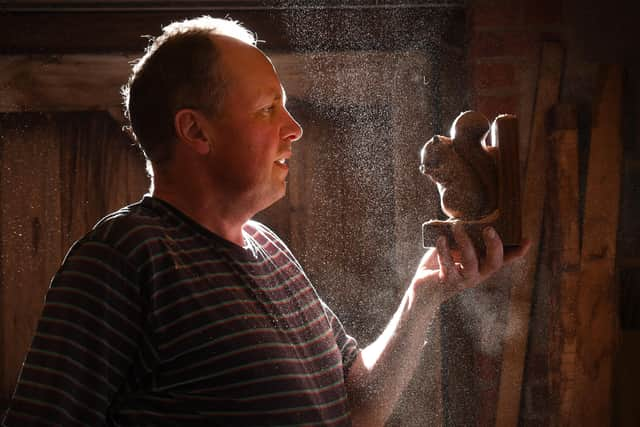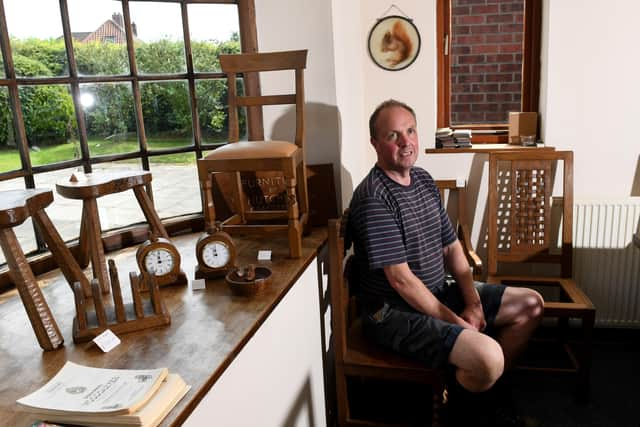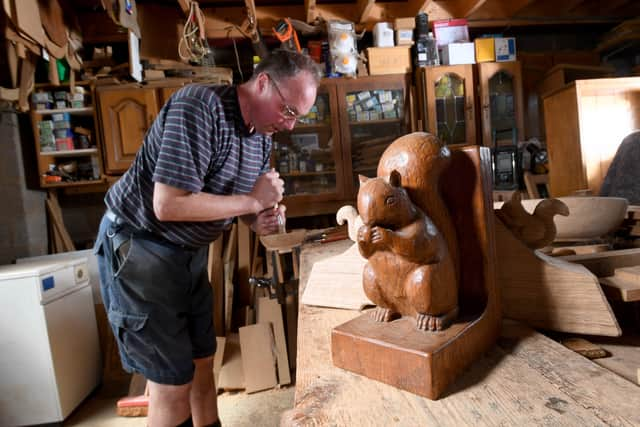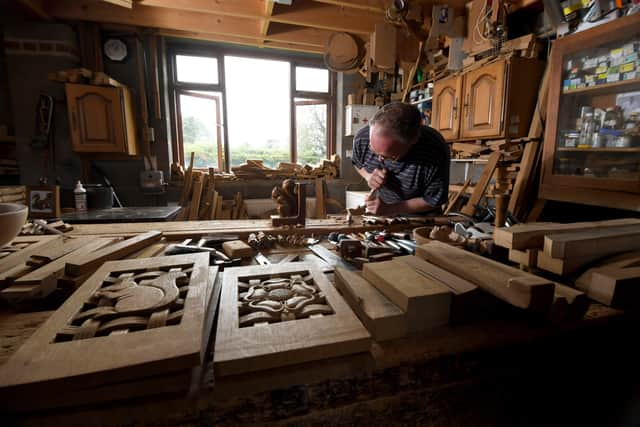Meet Yorkshire’s Squirrelman continuing his father’s wood-carving legacy
Trevor Hutchinson’s workshop seems calm and industrious. He is content here, working alone with only the radio for company. Apart from the occasional visitor or customer, this ordered place of wood, saws, chisels and sunshine slanting through dusty windows is his life; all that seasoned English oak is the material that sustains him. It’s quite a lonely life, I suggest. “Yes, I know,” says Trevor.
By way of escape and exercise, he walks his two labradors on Beacon Banks, opposite his house and workshop in Husthwaite in Hambleton, North Yorkshire.
Advertisement
Hide AdAdvertisement
Hide AdTrevor talks fondly about his father and the art of handmade oak furniture. Wilf Hutchinson cannot join in the conversation as he died in 2013, although in a way he can still have his say.


A short documentary on the British Film Institute website explores Wilf’s expertise. It was shot by Calendar in 1983, says Trevor, who features in the film as a 21-year-old.
The short film includes a gruesome detail that Trevor doesn’t mention: the time when Wilf, as an apprentice, cut his thumb off in an accident with a circular saw.
“My dad took me to the hospital in York and they said, ‘We’d better take it off, he may lose his arm if we try to save it’,” Wilf says in the film. His father told the hospital that he hoped not as Wilf had to use his fingers and thumbs in his work, and they managed to save his thumb.
Advertisement
Hide AdAdvertisement
Hide AdAfter being apprenticed to Robert Thompson, the notable furniture maker from Kilburn known as Mouseman, Wilf went solo in 1957 and became, in turn, a master woodworker. He passed on what he learned to Trevor, who is now a master furniture maker in his own right.


Trevor’s father died aged 76 as a consequence of his work. “Sadly, he had a tumour at the back of his nose from the oak dust and it affected a few people around here,” says Trevor, who wears masks when working and has an air-filtration system in his workshop. “But in them days nobody knew, it’s a bit like asbestos.”
Wilf served his apprenticeship with Thompson alongside master carver Stan Dodds, who later became friend and mentor to Trevor. The original trainees were known as critter craftsmen, named after Mouseman Thompson. Dodds was Woodpeckerman, while others adopted lizards, beavers, rabbits, wrens and unicorns as their woodwork symbols.
When Wilf set up in business in Husthwaite, he did so as Squirrelman, thanks to the squirrel motif on his pieces. Now Trevor has taken on the squirrel mantle, working as his father taught him, using tools once held by Wilf.
Advertisement
Hide AdAdvertisement
Hide Ad“These are all carving tools that my father collected as a young man,” Trevor says. “They’re antiques in themselves.”


At the age of 58, he lives the life his father once did. Wilf would still recognise the business as Trevor has followed the old ways, while gently developing his own ideas. He makes a range of designs, from small trinkets to grand pieces of furniture, such as tables and chairs, sideboards or occasionally a grandmother clock.
On a table there is a large bowl destined for a customer in Elland. Made from one piece of oak, it was turned on a lathe and hollowed out. This leaves a central stub which Trevor carves by hand into a squirrel, using his father’s old swan-necked tools.
It takes, he reckons, around three days to make a bowl like this. Everything is as his father did before him, although when pushed he says the squirrel at the centre is a little different than a Wilf squirrel.
Advertisement
Hide AdAdvertisement
Hide AdTrevor charges £150 for the bowl, not that much per hour when you work it out. “No, I think maybe I should put the price up,” he says, with a dry laugh.


In the shop stands a table made for a customer in Carlisle. Such a large piece of oak furniture takes a month to six weeks to make. “It’s a lot of work, it’s an adze top, the ripple on the top,” Trevor says.
He shows how this is done, picking up a piece of spare wood and his adze, a cutting tool somewhere between an axe and a hammer, and tapping away at the hard surface to produce the desired ripple effect. “My dad always taught me to just give a nice skim over the top, and after that you use a cabinet scraper to scrape each individual adze mark,” he says. “You’ve got to spend hours. As my dad would have said, ‘take pains with it.’”
The table costs around £2,000, not cheap until you add up all those hours of careful work.
Advertisement
Hide AdAdvertisement
Hide AdStill, Trevor is happy in what he does, a man content in his world of wood. At school he liked art and drawing, metalwork rather than woodwork. When he left he worked in an upholsterer’s for a while, before joining his father. “And that’s come in handy with the chairs,” he says.
Out in the shop, part way up the stairs to another floor of oak furniture, some made by Trevor, some by Wilf, his dad’s grandfather clock chimes. That clock won Wilf a £5 prize at the Great Yorkshire Show in 1968.
Trevor’s workshop, with pieces made and ready, some half-made and waiting to be finished, or older pieces returned for repair or resale, feels like a still point in a world that spins ever faster. Everything here is slow and solid, rather than quick and flimsy; nothing he makes could be squeezed into a flat-pack. In here time has stilled.
“My dad was brought up by Robert Thompson in the 1950s and I’ve continued that,” says Trevor.
Advertisement
Hide AdAdvertisement
Hide Ad“I still make pins by hand. That’s how he did it and I’ve stayed with it. It’s slower but it was how I was taught by him. I’ve stuck basically to that way. Stuck in my ways, I’ve kept it in the 1950s.”
Trevor makes one-off pieces, too. He points to a settle, a blanket box with a seat, as designed to a customer’s specifications.
The oak in his furniture is darkened with ammonia in a fuming chamber where the fumes penetrate and darken the wood overnight.
Trevor is open at weekends, so he often works when he should be having a day off. “We have visitors, so I’m pottering in here,” he says. He likes this place more than anywhere else. He doesn’t watch television as “there’s not much on and I have the radio in here”.
Advertisement
Hide AdAdvertisement
Hide AdEven slow and steady comes with deadlines though, and the work can pile up, more rings on the calendar. “I work on a night to make up,” Trevor says.
Does he have squirrels in his garden? “Yes,” he says. “Grey ones but not red ones.” You can’t tell for certain in oak, but Trevor insists he carves red squirrels.
A long-ago article in The Dalesman, written by a neighbour, helped to establish Wilf Hutchinson. At the start of that piece, he was described as “the young man with the curly dark hair”. That young man is no longer around but his son is still busy with saw and chisel.
As for Wilf, his pieces sometimes end up back in the shop. “People are downsizing,” says Trevor. “One of my dad’s bookcases came back and it sold within a week.”
Advertisement
Hide AdAdvertisement
Hide Ad“People from Surrey,” he adds, as if mentioning a faraway place, which from here it is.
Trevor has no family and lives with his elderly mother. There is no one to hand the business to and it will probably “just fizzle out”. “I haven’t really thought about it because I’m that busy working,” he says.
Besides, he has a timber shed full of oak from Summerbridge. “That’ll keep me going for quite a lot of years.”
For more information go to www.squirrelman.co.uk
Support The Yorkshire Post and become a subscriber today.
Your subscription will help us to continue to bring quality news to the people of Yorkshire. In return, you’ll see fewer ads on site, get free access to our app and receive exclusive members-only offers.
Advertisement
Hide AdAdvertisement
Hide AdSo, please - if you can - pay for our work. Just £5 per month is the starting point. If you think that which we are trying to achieve is worth more, you can pay us what you think we are worth. By doing so, you will be investing in something that is becoming increasingly rare. Independent journalism that cares less about right and left and more about right and wrong. Journalism you can trust.
Thank you
James Mitchinson
Comment Guidelines
National World encourages reader discussion on our stories. User feedback, insights and back-and-forth exchanges add a rich layer of context to reporting. Please review our Community Guidelines before commenting.